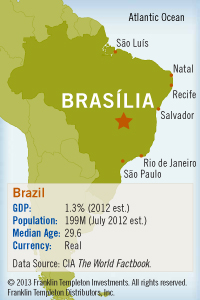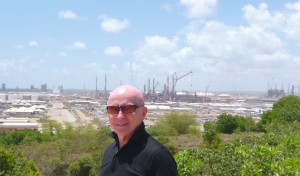By Mark Mobius, From http://mobius.blog.franklintempleton.com/2013/04/03/dodging-soccer-balls-and-sharks-in-recife-brazil/
Recife, in Brazil’s northeast Pernambuco state, is known to many as the “Venice of Brazil” given its many waterways and bridges.
A welcome winter stop for our emerging markets team, the city is blessed with a tropical climate that’s as warm and sunny as its people. While the residents in this area of Brazil are often regarded as being extremely laid back given the balmy weather, we found them to be very hard workers. For example, our local taxi driver reported working about 12 hours a day, six days a week! We found this seaside and shipping hub was not only a hotbed of tourist activity, but of potential investment opportunities as well.
Football Fans
 Recife will be one of the 12 cities playing host to the 2014 FIFA World Cup Brazil™, so many were also hard at work on infrastructure and construction projects there. Like the rest of Brazil, Recife’s residents are football (aka “soccer” in North America) crazy. A big city with a population of four million, Recife has its share of problems, including a reputation for violent crime, though with a homicide rate below that of many other large cities, including Detroit and New Orleans in the U.S.1
Recife will be one of the 12 cities playing host to the 2014 FIFA World Cup Brazil™, so many were also hard at work on infrastructure and construction projects there. Like the rest of Brazil, Recife’s residents are football (aka “soccer” in North America) crazy. A big city with a population of four million, Recife has its share of problems, including a reputation for violent crime, though with a homicide rate below that of many other large cities, including Detroit and New Orleans in the U.S.1
Perhaps an even greater danger is in the water—with aggressive sharks lurking off the coast of Recife’s beautiful beaches, an important tourist draw. Recife’s name refers to the reef surrounding parts of the beaches, but sharks come in at high tide, so swimmers and surfers need to be careful. Since 1992, there have been more than 50 shark attacks, some fatal. Surfing off the coast of urban beaches was outlawed in 1995, and state officials have tried to reduce shark attacks by posting warning signs along the beaches and using patrol boats to capture sharks too close to the coast. Although Recife has been named among the top ten places in the world for shark attacks, of course it’s not the only place in the world where shark attacks are a problem. The list also includes locations in Australia and South Africa, as well as Hawaii, California and Florida in the U.S. The good news is that the Recife government has taken strong measures to help prevent such attacks.
From Soft Sand to Concrete
Of course, we didn’t visit Recife for its sandy beaches; we went to evaluate a pre-stressed concrete firm. That meant visiting a number of construction sites, particularly factory buildings and others with large, open spans. A strong, structural material used to overcome concrete’s natural tension weakness, pre-stressed concrete is a combination of high-strength concrete and steel bands that is used in various aspects of construction, from beams to floors to bridges.
One of the best examples of the use of pre-stressed concrete we saw was the just-completed Rio Mar Mall, an impressive, modern, beautifully designed—and huge—building.
We also explored the Suape Industrial Port Complex area. Thanks to government fiscal incentives, many industrial enterprises started in the 1970s and 1980s in Brazil. Today, the Suape Port area is the site of a number of industries including brewing, canning, automotive electronics and textiles. It’s a large shipyard where we observed two highly complex oil production ships under construction, part of the government’s efforts to locally source Brazil’s offshore oil industry, drill ships, production ships and offshore platforms.
We also visited the enormous 13,500 hectare construction project in the Port area, which includes an oil refinery and petrochemical complex in addition to many subsidiary and supporting industrial projects. A joint venture between Brazil and Venezuela, the plan is to process heavy oil from Venezuela and Brazil to produce diesel and other petrochemicals to help meet growing demand from northeastern Brazil. The initial estimated cost of the project was US$2.5 billion, but the budget has reportedly exploded to over US$16 billion. The partnership showed signs of cracking amid funding and political issues, but the China Development Bank stepped up with 75% of the loan guarantees needed to continue, in exchange for future shipments of oil. Construction began in 2006 and is still not yet complete. From our bird’s eye view of the enormous construction site, we saw lots of activity, but completion this year seems ambitious given how much remains to be done.
When completed, Recife’s petrochemical complex could potentially benefit the people of Brazil. Sugar is a major crop in the country, and the ethanol made from sugar is an important industry. As a result of these projects—in addition to the booming tourist industry—Recife is throbbing with activity. With a growing population, the retail businesses have been doing quite well—as evidenced by the crowded malls. We are finding a number of potential investment opportunities in northeast Brazil and plan to spend more time in the area—but it’s fairly safe to say surfing won’t be on our agenda!
1. Source: The Citizens’ Council for Public Security and Criminal Justice, 2012.
Tags: 2014 FIFA World Cup Brazil™, BRAZIL, brazil construction projects, brazil drill ships, brazil petrochemical industry, brazil sea port, brazil sugar crop, brazil's ethanol industry, brazil's shipping hub, Brazil’s offshore oil industry, brazilian infrastructure build out, brazilian offshore platform industry, chinese loans from chinese development bank, Latin America, oil refinery, olympics 2016, production ships, recife, recife's beaches, recife's petrochemical complex, refining venezuela heavy crude oil, Suape Industrial Port Complex area, tourism, venezuela and brazil oil refining partnership, venice of brazil, World Cup 2014
 Oxstones Investment Club™
Oxstones Investment Club™